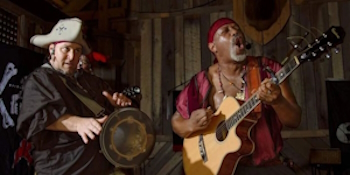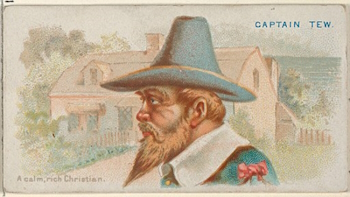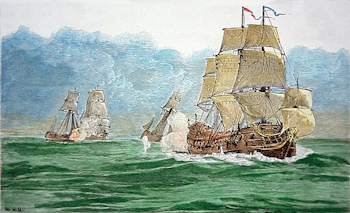 Pirates Creed is a dynamic duo composed of two best friends, known as the Navigator and the Quartermaster. They’re the masterminds behind the band’s unique sound, blending “grog rock” and “Sea Grass” music with a pirate twist. These two musicians have a long history of performing together, having met while playing in another pirate band at the Ohio Renaissance Festival. They decided to join forces and create Pirates Creed.
Pirates Creed is a dynamic duo composed of two best friends, known as the Navigator and the Quartermaster. They’re the masterminds behind the band’s unique sound, blending “grog rock” and “Sea Grass” music with a pirate twist. These two musicians have a long history of performing together, having met while playing in another pirate band at the Ohio Renaissance Festival. They decided to join forces and create Pirates Creed.
Thomas Tew
 Thomas Tew was one of the most well-known Red Sea pirates active in the 1690s. It is thought he was born in 1649, but it is unsure exactly where. Suggestions include Rhode Island in the American colonies and Northamptonshire in England, although evidence seems to be lacking for the latter. Whether from Rhode Island or not, it is believed Tew had family in Rhode island. He was thought to have been married with two daughters, one of whom was named Amity, living in Newport, Rhode Island. He is best known, along with other infamous pirates such as Henry Avery and William Kidd, for sailing the Pirate Round, a sailing route followed by certain pirates during the late 17th century leading from the western Atlantic, running parallel to the Cape Route around the southern tip of Africa until Madagascar. From there one could reach targets in the Red Sea and India.…
Thomas Tew was one of the most well-known Red Sea pirates active in the 1690s. It is thought he was born in 1649, but it is unsure exactly where. Suggestions include Rhode Island in the American colonies and Northamptonshire in England, although evidence seems to be lacking for the latter. Whether from Rhode Island or not, it is believed Tew had family in Rhode island. He was thought to have been married with two daughters, one of whom was named Amity, living in Newport, Rhode Island. He is best known, along with other infamous pirates such as Henry Avery and William Kidd, for sailing the Pirate Round, a sailing route followed by certain pirates during the late 17th century leading from the western Atlantic, running parallel to the Cape Route around the southern tip of Africa until Madagascar. From there one could reach targets in the Red Sea and India.…
Pirates and privateers
 The terms pirate and privateer are unclear to many people, but there was a clear distinction which was made between the two in the past, even if a shadowy grey area did exist for many people. In fact, during the Age of Sail, one man’s privateer was often another man’s pirate. First we must look at what a pirate is. The word itself is derived with the Greek peiratēs, meaning brigand, and like a brigand or bandit there were no restrictions on whom they attacked. They were outlaws plain and simple, possessing no legal commission, or one which covered the specific act of aggression they carried out. They often had their own flags, usually only flying the flag of a nation under false colours to trick their prey, although those pirates who considered themselves patriots might have flown the flag of their own nation too. They usually obtained their vessel by means of mutiny or capture.…
The terms pirate and privateer are unclear to many people, but there was a clear distinction which was made between the two in the past, even if a shadowy grey area did exist for many people. In fact, during the Age of Sail, one man’s privateer was often another man’s pirate. First we must look at what a pirate is. The word itself is derived with the Greek peiratēs, meaning brigand, and like a brigand or bandit there were no restrictions on whom they attacked. They were outlaws plain and simple, possessing no legal commission, or one which covered the specific act of aggression they carried out. They often had their own flags, usually only flying the flag of a nation under false colours to trick their prey, although those pirates who considered themselves patriots might have flown the flag of their own nation too. They usually obtained their vessel by means of mutiny or capture.…
François l’Olonnais
 Francois l’Olonnais was renowned for being particularly cruel and was especially feared by the Spanish colonists. Very little is know about his early life. It is known that his real name was Jean-David Nau and that he later became known as Francois l’Olonnais, meaning Frenchman from Sables-d’Olonne, referring the place he was born in sometime between 1630 and 1635. It is thought he received this name while on Tortuga. He was also sometimes simply known as Captain Francois. His family were so poor they sold him or he sold himself as an indentured servant to the French West India Company when he was fifteen. At first, he was sent to work on a sugar plantation in the French colony of Martinique in the Caribbean in the 1650s, sometime later ending up on Tortuga, off the coast of Hispaniola. While serving his three-year indenture, he got to know many buccaneers. What we know of this infamous pirate captain comes mostly from Alexandre Exquemelin’s 1678 account in the Dutch version The History of the Buccaneers of America.…
Francois l’Olonnais was renowned for being particularly cruel and was especially feared by the Spanish colonists. Very little is know about his early life. It is known that his real name was Jean-David Nau and that he later became known as Francois l’Olonnais, meaning Frenchman from Sables-d’Olonne, referring the place he was born in sometime between 1630 and 1635. It is thought he received this name while on Tortuga. He was also sometimes simply known as Captain Francois. His family were so poor they sold him or he sold himself as an indentured servant to the French West India Company when he was fifteen. At first, he was sent to work on a sugar plantation in the French colony of Martinique in the Caribbean in the 1650s, sometime later ending up on Tortuga, off the coast of Hispaniola. While serving his three-year indenture, he got to know many buccaneers. What we know of this infamous pirate captain comes mostly from Alexandre Exquemelin’s 1678 account in the Dutch version The History of the Buccaneers of America.…



